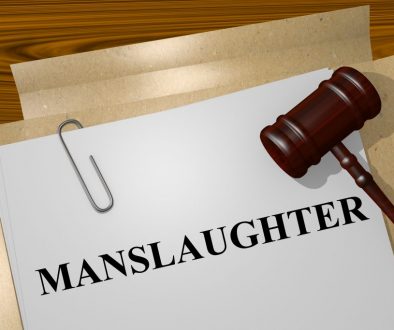Does Karmelo Anthony Have a Self Defense Argument Following the Stabbing Death of Austin Metcalf in Frisco, Texas? How is Self Defense in New Jersey Different from Pennsylvania and Texas
Our criminal defense law firm represents people charged with violent and non-violent offenses in Pennsylvania and New Jersey. In cases involving the allegation of violence against our client a common and critical issue is that of self-defense. New Jersey and Pennsylvania refer to self-defense as “justification” under their crimes code and both jurisdictions separate it further into non-deadly and deadly categories.
Karmelo Anthony Charged with Murder – Bringing a Knife to Fist Fight?
Last week, 17 year old, Karmelo Anthony was charged with 1st Degree Murder following the stabbing death of 16 year old Austin Metcalf. An altercation between Metcalf and Anthony resulted in Antony fatally stabbing Metcalf. Anthony allegedly reached into his gym bag and told Metcalf: ‘touch me and we’ll see what happens.’ Metcalf pushed Anthony and Anthony stabbed him in the chest and ran away, according to a witness. There is alleged evidence that Metcalf and Anthony has some type of prior incident or at least a connection involving Anthony’s girlfriend.
The altercation allegedly occurred initially when Metcalf, a Memorial High School junior, asked Anthony, a Centennial High School student, to move from underneath Memorial’s pop-up tent during a rain delay and Anthony refused, according to an arrest report.
Anthony immediately unzipped a bag, reached inside and told Metcalf, “touch me and see what happens,” a witness told police.
When can your criminal defense lawyer make a self defense argument?
Self-defense (Title 18, Section 505, PA; 2C: 3-4, NJ) is complete defense against an allegation of violence provided that a defense lawyer properly asserts it at trial. This defense tool is exclusively reserved for at trial as it directly pertains to the prosecutions ability to meet a burden of proof beyond a reasonable doubt which is a criminal standard in all cases.
A criminal defense lawyer cannot assert a self-defense argument at a preliminary hearing in Pennsylvania or a motion to quash the indictment in New Jersey. It is strictly a trial issue which a judge or jury must decide based on the evidence presented at trial.
Texas, like New Jersey, maintains a Grand Jury System and is highly likely that Anthony’s case will proceed to trial in Frisco, Texas unless he enters a guilty plea.
What is deadly force?
Deadly force (Title 18, Section 505b, PA; 2C: 3-4b, NJ) is force that, under the circumstances in which it is used, is readily capable of causing death or serious bodily injury (i.e., shooting a gun at an attacker or striking them with some object on a vital part of their boy).
The law in Pennsylvania and New Jersey defines serious bodily injury as that type of injury which creates a substantial risk of death or causes serious permanent disfigurement or loss or impairment of any bodily member or organ.
It is important to remember that force is not deadly simply because it happens to kill or injure someone seriously. There are examples where a punch freakishly causes another’s death and, in these situations, it is difficult, if not impossible, for the prosecution to establish deadly force.
How is Texas Similar to Pennsylvania and New Jersey
In New Jersey, Pennsylvania and Texas, a person enjoys the highest level of self-defense protection within his home and the prosecution cannot establish that deadly force used within a home was not justified simply because it was not proportional to the level of force used in the attack or entry.
In all other cases the right of self-defense is measured against necessity and when it is asserted, a trial judge must instruct the jury on the issue of self-defense and allow them to determine if it is justified. The burden is always on the prosecution in deadly and non-deadly self-defense cases.
Deadly Force & Self Defense
In the case of deadly force, the prosecution must establish that the use of deadly force was not justified through any of the following means:
- the defendant did not reasonably believe that he was in immediate danger of death or serious bodily injury (including kidnapping or rape)
- the defendant himself provoked the use of force against him
- the defendant could avoid the necessity of using self-defense with complete safety by retreating
Non Deadly (Protective Force) & Self Defense
In the case of non-deadly (protective force) the prosecution must establish any of the following:
- The defendant did not reasonably believe that it was immediately necessary for him to use force to protect himself.
- The defendant himself provoked the level of force used against him.
What is the Castle Doctrine? Stand Your Ground Laws – How is Pennsylvania like Texas
New Jersey and Pennsylvania both maintain the Castle Doctrine with means that a person has a right to defend their home with force against an intruder. New Jersey however, unlike Pennsylvania, does not have a Stand Your Ground law. Stand your ground law is a self-defense statute which means you can use force to protect yourself anywhere you are allowed to be including the public with no duty to retreat.
While Pennsylvania does maintain a stand your ground law it is not absolute, and it only applies in situations outside a home if there is a reasonable expectation of immediate danger.
This means that a weapon such as a knife or gun is visible and immediately accessible. In addition, the self-defense must be “immediately necessary”. This means that if an attacker tries to run away, force is no longer justified.
How Self Defense Changed in 2011 in Pennsylvania
In 2011 however, Pennsylvania expanded the castle doctrine to include places outside of the person’s home. The expanded castle doctrine also eliminated the burden on the accused to demonstrate that they “reasonably believed that the use of force was necessary”.
Specifically, Pennsylvania expanded law stated that deadly force is immediately necessary to protect against death, serious bodily injury, kidnapping, or sexual intercourse compelled by a force or threat if both of the following conditions exist:
- The person against who the force is used is in the process of unlawfully or forcefully entering or has unlawfully and forcefully entered and is present within a dwelling, residence, or occupied vehicle; or the person whom the force is used is or attempting to forcefully and unlawfully remove another against the others will from the dwelling, residence, or occupied vehicle.
- The actor knows or has reason to believe that unlawful or forceful entry is occurring or has occurred.
What is a dwelling and what is also covered under the expanded law?
Pennsylvania and Texas law define a residence as a dwelling in which a person resides either temporarily or permanently or visits as an invited guest. The definition of dwelling also includes attached porches, decks, and patios.
The expanded castle doctrine also included a “stand your ground” provision which states the following: “an actor who is not engaged in a criminal activity, who is not in illegal possession of a firearm and is attacked in any place can employ deadly force if:
- The actor has a right to be in the place where he was attacked,
- The actor believes it is immediately necessary to protect himself against death, serious bodily injury, kidnapping, or sexual intercourse by force or threat,
- The person against whom the force is used displays or otherwise uses a firearm or any other weapon readily or apparently capable of lethal use.
What is the Law in Texas and What is the Major Issue in Karmelo Anthony’s Case
Texas law states that you have no duty to retreat if you reasonably believe you are in immediate danger, and you can use force, including deadly force, to protect yourself or others. The use of force, including deadly force, must be justified based on a reasonable belief that it is immediately necessary to prevent imminent death or serious bodily injury, or to prevent the commission of certain violent crimes like sexual assault, kidnapping, murder, or robbery. The force used must be proportionate to the threat.
Proportionality is likely the major issue in the Atnhony murder case in Frisco Texas. There is no evidence that Metcalf was armed but only that he pushed Anthony. Anthony’s criminal defense lawyer will have to address this issue as the prosecution will highlight it when it attempts to convict Anthony for this murder.
At trial, the Prosecutor will argue that Anthony brought a knife to a what was likely at most a fist fight or war of words between two teenagers. There is also no evidence at this time that Anthony sustained any injury prior to stabbing Metcalf. Finally, Anthony ran away and did not attempt to offer aid or even call police when it was clear that Metcalf was injured at presented no threat to him.
While there is alleged evidence that Anthony and Metcalf had some prior altercation, this may not be sufficient to justify the killing.
If this case does go to trial, it will likely make national headlines on a daily basis!


